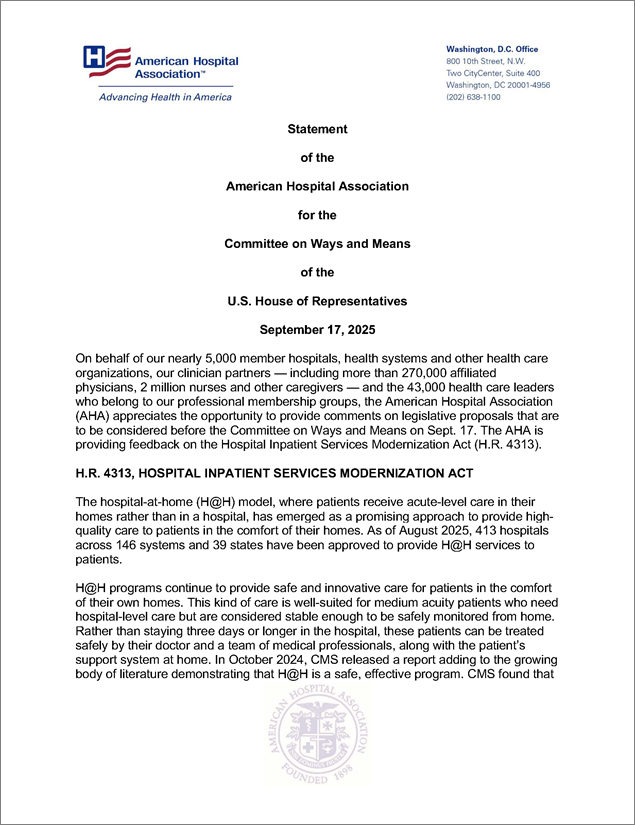AHA Statement for the House Committee on Ways and Means on Hospital Inpatient Services Modernization Act (H.R. 4313)
Statement
of the
American Hospital Association
for the
Committee on Ways and Means
of the
U.S. House of Representatives
September 17, 2025
On behalf of our nearly 5,000 member hospitals, health systems and other health care organizations, our clinician partners — including more than 270,000 affiliated physicians, 2 million nurses and other caregivers — and the 43,000 health care leaders who belong to our professional membership groups, the American Hospital Association (AHA) appreciates the opportunity to provide comments on legislative proposals that are to be considered before the Committee on Ways and Means on Sept. 17. The AHA is providing feedback on the Hospital Inpatient Services Modernization Act (H.R. 4313).
H.R. 4313, HOSPITAL INPATIENT SERVICES MODERNIZATION ACT
The hospital-at-home (H@H) model, where patients receive acute-level care in their homes rather than in a hospital, has emerged as a promising approach to provide high-quality care to patients in the comfort of their homes. As of August 2025, 413 hospitals across 146 systems and 39 states have been approved to provide H@H services to patients.
H@H programs continue to provide safe and innovative care for patients in the comfort of their own homes. This kind of care is well-suited for medium acuity patients who need hospital-level care but are considered stable enough to be safely monitored from home. Rather than staying three days or longer in the hospital, these patients can be treated safely by their doctor and a team of medical professionals, along with the patient’s support system at home. In October 2024, CMS released a report adding to the growing body of literature demonstrating that H@H is a safe, effective program. CMS found that patients and caregivers also expressed predominantly positive experiences with the program.
The AHA supports the Hospital Inpatient Services Modernization Act, which would extend the H@H waiver for five years through the end of 2030 and direct the Centers for Medicare & Medicaid Services to conduct a new study of the program. A long-term extension of the H@H waiver would not only provide additional time to continue gathering data on quality improvement, cost savings and patient experience but would also provide much-needed stability for patients and providers.
Over the past few years, hospitals and health systems have expressed the need for long-term stability within the H@H program. Standing up a H@H program requires logistical and technical work, with an investment of time, staff and money. In addition to being approved for the federal waiver, some providers must navigate additional regulatory requirements at the state level. For some, this whole process could take a year or more to complete before the first patient can be seen at home. A longer extension of the H@H program would provide much-needed stability for existing programs to continue providing care and encouragement for additional hospitals and health systems to participate.


